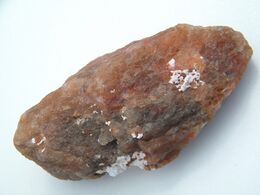Chemistry:Langbeinite
| Langbeinite | |
|---|---|
 | |
| General | |
| Category | Sulfate mineral |
| Formula (repeating unit) | K2Mg2(SO4)3 |
| Strunz classification | 7.AC.10 |
| Crystal system | Cubic |
| Crystal class | Tetartoidal (23) (same H-M symbol) |
| Space group | P213 |
| Unit cell | a = 9.92 Å; Z = 4 |
| Identification | |
| Color | Colorless with pale shades of yellow, pink, red, green, gray |
| Crystal habit | As nodules, disseminated grains, bedded massive |
| Fracture | Conchoidal |
| Tenacity | Brittle |
| Mohs scale hardness | 3.5–4 |
| |re|er}} | Vitreous |
| Diaphaneity | Transparent |
| Specific gravity | 2.83 |
| Optical properties | Isotropic |
| Refractive index | n = 1.5329–1.5347 |
| Solubility | 280 g/L (20°C);[1] Slowly dissolves in water[2] |
| Other characteristics | Piezoelectric |
| References | [3][4][5] |
Langbeinite is a potassium magnesium sulfate mineral with the chemical formula K2Mg2(SO4)3. Langbeinite crystallizes in the isometric-tetartoidal (cubic) system as transparent colorless or white with pale tints of yellow to green and violet crystalline masses. It has a vitreous luster. The Mohs hardness is 3.5 to 4 and the specific gravity is 2.83. The crystals are piezoelectric.[3]
The mineral is an ore of potassium and occurs in marine evaporite deposits in association with carnallite, halite, and sylvite.[3]
It was first described in 1891 for an occurrence in Wilhelmshall, Halberstadt, Saxony-Anhalt, Germany , and named for A. Langbein of Leopoldshall, Germany.[3][4]
Langbeinite gives its name to the langbeinites, a family of substances with the same cubic structure, a tetrahedral anion, and large and small cations.
Related substances include hydrated salts leonite (K2Mg(SO4)2·4H2O) and picromerite (K2Mg(SO4)2·6H2O).
References
- ↑ Artiola, Janick F.; Gebrekidan, Heluf; Carty, David J. (October 2000). "Use of langbeinite to reclaim sodic and saline sodic soils". Communications in Soil Science and Plant Analysis 31 (17–18): 2829–2842. doi:10.1080/00103620009370631.
- ↑ Harley, G. T.; Atwood, G. E. (January 1947). "Langbeinite... Mining and processing". Industrial & Engineering Chemistry 39 (1): 43–47. doi:10.1021/ie50445a020.
- ↑ 3.0 3.1 3.2 3.3 Handbook of Mineralogy
- ↑ 4.0 4.1 Mindat with location data
- ↑ Webmineral data
- ↑ Warr, L.N. (2021). "IMA–CNMNC approved mineral symbols". Mineralogical Magazine 85 (3): 291–320. doi:10.1180/mgm.2021.43. Bibcode: 2021MinM...85..291W.
 |
